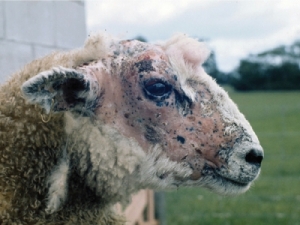Early zinc prevention key as farmers prepare for Facial Eczema season
As we move towards the warmer, more humid months, farmers across New Zealand are already preparing for the annual challenge of facial eczema (FE).
 FE tolerance breeding has been possible for 32 years and has had a strong dampening effect on the noxious curse that is FE.
FE tolerance breeding has been possible for 32 years and has had a strong dampening effect on the noxious curse that is FE.
Peter Burke's article 'Facial eczema hitting lambing percentages' (May 24) was disturbing because, unfortunately, he will be right.
But it should and could have been quite unnecessary.
FE tolerance breeding has been possible for 32 years and has had a strong dampening effect on the noxious curse that is FE.
It has been a remarkable success story in the participating ram breeding flocks and their clients. As a member of Ramguard, I am not surprised that in the article the failure of so-called 'FE tolerant rams' was mentioned.
The emphasis should possibly have been on 'so-called' because a lot of ram breeders claim FE tolerance or imply FE tolerance when they have no right to do so. To counter so-called FE tolerance, the FE Gold group was formed by Ramguard members four years ago. These ram breeders have tested their rams for at least 10 years with sporidesmin (FE causing toxin) at 0.6mg/kg bodyweight. The group is trying to educate farmers on FE and counter unjustified claims by non-registered breeders.
My FE testing of breeding flocks reversed its pass rate from 92% fail to at least 90% pass, whilst increasing the sporidesmin dose rate from 0.1 to 0.6mg over a period of 16 years. Ruakura then stopped at that rate because it was deemed sufficient for most years and there is only so much you can do genetically. Also sporidesmin is very expensive to manufacture.
The science behind FE tolerance breeding does work and the progress made suggests success. But that does not mean the end of all problems regarding FE. It was discovered that sporidesmin, a mycotoxin, not only has a genetic component, but that immune and metabolic systems are also involved in a very complicated chemical process.
The testing on the male side only is also having an effect on the progress of FE tolerance; hence after years of testing for FE there are still questions. However, buying FE tolerant rams from a Ramguard registered flock will definitely restrict losses.
A bad FE year occurs infrequently – every 10 years or so. But farmers tend to believe that lightning does not strike twice, so they forget that it happens almost every year in the sub-clinical form and that it suppresses their sheep production unnoticed and unseen. With climate change, these bad FE years could become more frequent.
MAF (now AgResearch) decided more than a decade ago that further research was not necessary and no money was made available, hence the problems with FE are still in limbo. It is time AgResearch returned to do serious research on FE.
• Edward Dinger is a retired ram breeder, member of FE Gold and editor of the Sheep Council publication 'Facing up to Facial Eczema'.
Controls on the movement of fruit and vegetables in the Auckland suburb of Mt Roskill have been lifted.
Fonterra farmer shareholders and unit holders are in line for another payment in April.
Farmers are being encouraged to take a closer look at the refrigerants running inside their on-farm systems, as international and domestic pressure continues to build on high global warming potential (GWP) 400-series refrigerants.
As expected, Fonterra has lifted its 2025-26 forecast farmgate milk price mid-point to $9.50/kgMS.
Bovonic says a return on investment study has found its automated mastitis detection technology, QuadSense, is delivering financial, labour, and animal-health benefits on New Zealand dairy farms worth an estimated $29,547 per season.
Pāmu has welcomed ten new apprentices into its 2026 intake, marking the second year of a scheme designed to equip the next generation of farmers with the skills, knowledge, and experience needed for a thriving career in agriculture.

OPINION: Here w go: the election date is set for November 7 and the politicians are out of the gate…
OPINION: ECan data was released a few days ago showing Canterbury farmers have made “giant strides on environmental performance”.